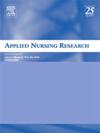Scenario-based simulation training as a strategy to improve infection prevention and control adherence: A quasi-experimental study
IF 2.7
4区 医学
Q1 NURSING
引用次数: 0
Abstract
Background
Healthcare-associated infections remain a critical global health concern, adversely affecting patient outcomes and increasing healthcare costs. Effective infection prevention and control measures are essential to mitigating healthcare-associated infections, yet traditional educational methods often fail to ensure their practical application.
Objective
This study evaluates the effectiveness of scenario-based simulation training in improving infection control knowledge, self-efficacy, and adherence to standard precautions among clinical nurses.
Methods
A quasi-experimental pre-test/post-test design with a nonequivalent control group was employed. Sixty-eight clinical nurses were randomly assigned to an experimental or control group. The intervention included four scenario-based simulation sessions on standard and transmission-based precautions. Outcomes were assessed at baseline and two months post-intervention using validated instruments. Data were analyzed using paired t-tests and independent t-tests.
Results
Nurses in the experimental group demonstrated significant improvements in infection control knowledge (t = 7.111, p < .001, Cohen's d = 1.725, 95 % CI [1.086, 2.348]), self-efficacy (t = 2.194, p = .032, Cohen's d = 0.532, 95 % CI [0.036, 1.021]), and adherence to standard precautions (t = 4.191, p < .001, Cohen's d = 1.017, 95 % CI [0.476, 1.545]) compared to the control group. These findings underscore the efficacy of simulation training in enhancing infection prevention and control competencies among clinical nurses.
Conclusion
Scenario-based simulation training is a valuable educational strategy for improving infection prevention and control practices among clinical nurses. Integrating this approach into infection prevention and control training programs can strengthen infection prevention efforts, enhance healthcare worker preparedness, and improve patient safety.
基于场景的模拟训练作为提高感染预防和控制依从性的策略:一项准实验研究
背景:医疗保健相关感染仍然是一个重要的全球健康问题,对患者的预后产生不利影响,并增加医疗保健成本。有效的感染预防和控制措施对于减轻医疗保健相关感染至关重要,但传统的教育方法往往不能确保其实际应用。目的评价基于场景的模拟培训在提高临床护士感染控制知识、自我效能感和遵守标准预防措施方面的效果。方法采用准实验前测/后测设计,设非等效对照组。68名临床护士随机分为实验组和对照组。干预措施包括四次基于场景的模拟会议,讨论标准预防措施和基于传播的预防措施。使用经过验证的仪器在基线和干预后两个月评估结果。数据分析采用配对t检验和独立t检验。结果实验组护士感染控制知识有显著提高(t = 7.111, p <;.001, Cohen’s d = 1.725, 95% CI[1.086, 2.348])、自我效能(t = 2.194, p = 0.032, Cohen’s d = 0.532, 95% CI[0.036, 1.021])和对标准预防措施的依从性(t = 4.191, p <;.001, Cohen’s d = 1.017, 95% CI[0.476, 1.545])。这些发现强调了模拟培训在提高临床护士感染预防和控制能力方面的有效性。结论基于场景的模拟培训是提高临床护士感染防控实践的一种有价值的教育策略。将这种方法纳入感染预防和控制培训计划可以加强感染预防工作,增强卫生保健工作者的准备,并改善患者安全。
本文章由计算机程序翻译,如有差异,请以英文原文为准。
求助全文
约1分钟内获得全文
求助全文
来源期刊

Applied Nursing Research
医学-护理
CiteScore
4.50
自引率
0.00%
发文量
65
审稿时长
70 days
期刊介绍:
Applied Nursing Research presents original, peer-reviewed research findings clearly and directly for clinical applications in all nursing specialties. Regular features include "Ask the Experts," research briefs, clinical methods, book reviews, news and announcements, and an editorial section. Applied Nursing Research covers such areas as pain management, patient education, discharge planning, nursing diagnosis, job stress in nursing, nursing influence on length of hospital stay, and nurse/physician collaboration.
 求助内容:
求助内容: 应助结果提醒方式:
应助结果提醒方式:


